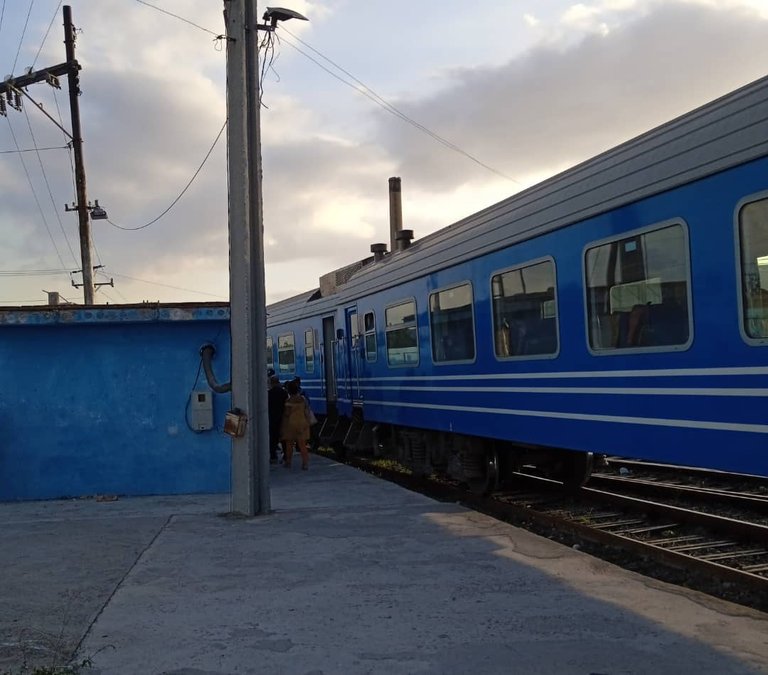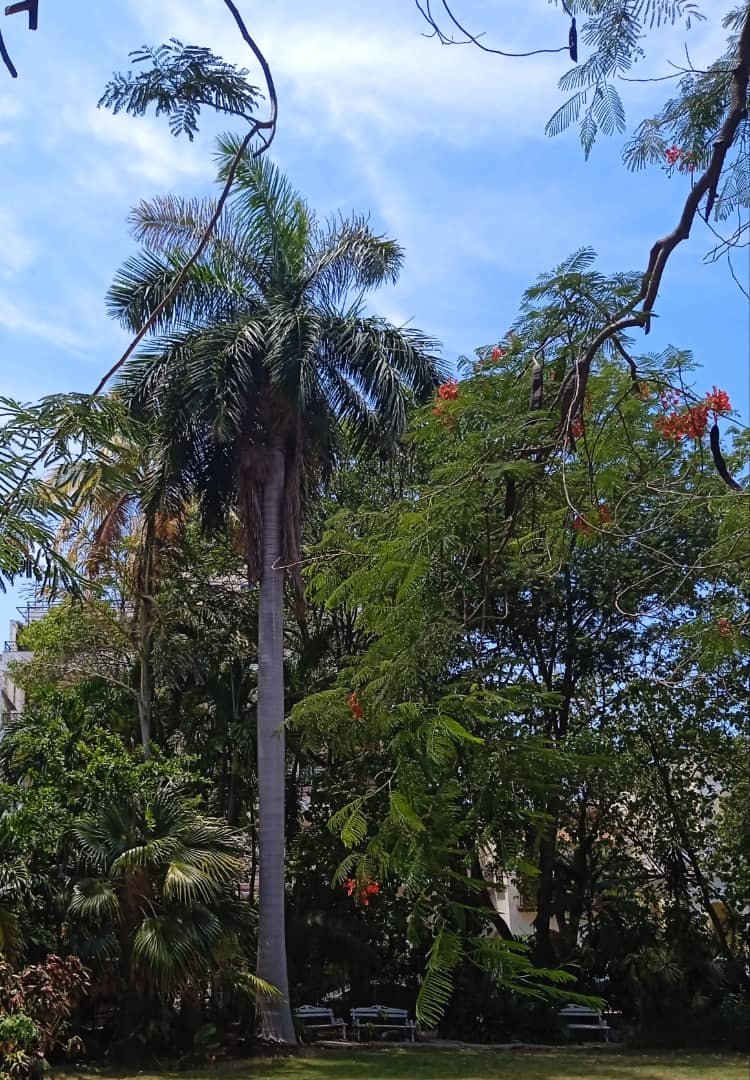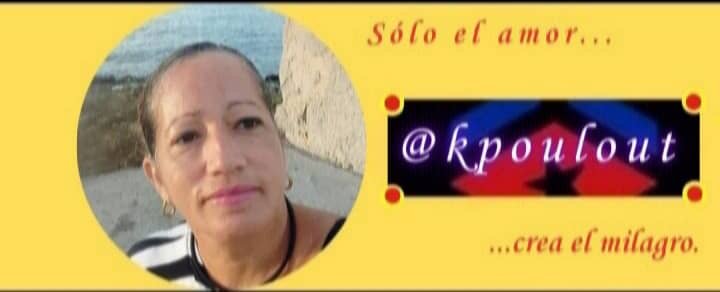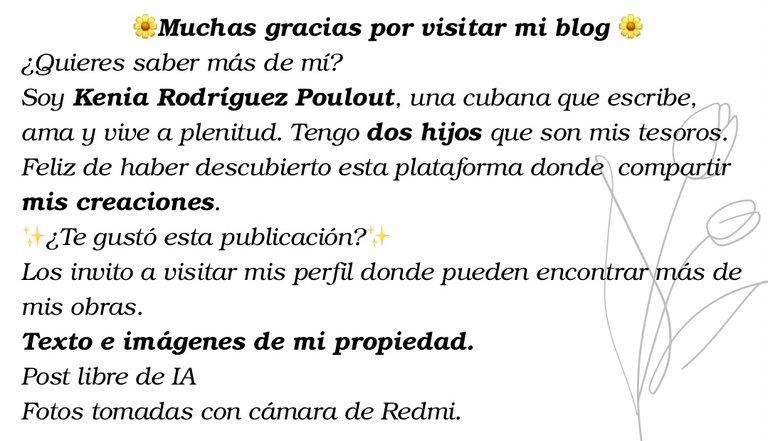Hola, mis amigos. Hoy entramos en la recta semifinal de la historia de Maura. Me alegra mucho saber que la están disfrutando.

Según su juicio, una mujer con cinco años más que su hijo, era solo una opción de escape, nunca para esposa.
Por su parte, Maura ponía sus dineros en el banco y seguía viviendo del invento. Las llamadas de Ernesto dos veces por semana, eran los minutos más esperados hasta tanto se volvieran a ver. Él se encargaría de decirle a la madre, en su momento, su convicción de estar con ella. El refugio de Ernesto para ahuyentar la tristeza y olvidar las horas, eran los libros.
Leonor, hipertensa y diabética, cada cierto tiempo caía en crisis y tardaba días en recuperarse, mucho más después de enviudar. Días en que Maura la cuidaba con mucho cariño y sin el menor interés. Todo esto hizo que Leonor se replanteara sus intenciones de impedir que aquella relación con su hijo se convirtiera en algo más fuerte y poderoso. En realidad no era la típica suegra malvada y solo quería la felicidad de Ernesto, así que, de momento, se mantuvo aparentemte al margen, sin tomar ninguna medida.
Maura siempre se preguntó de dónde sacaba Leonor dinero para pagarle, hasta que supo, por su propia boca, que toda la familia había abandonado el país, unos después de 1959 y otros un poco más tarde. No daban afecto, en cambio, nunca faltaron las remesas.
El patrón de idas y vueltas a prisión se repitió durante dos largos años. El amor entre Ernesto y Maura crecía. En aquel lugar incómodo era donde, irónicamente, Maura encontraba paz y tranquilidad. Además de los pabellones, donde siempre usaron condón, Maura incluyó las visitas familiares. Acompañaba a Leonor que aún se mantenía discretamente reacia a la relación, y no dejó de pagarle un centavo de lo acordado.
Un suceso ajeno a sus voluntades y a la voluntad de cualquiera, fue causa de distanciamiento entre ellos. Desde Oriente, Maura recibió una llamada de su única hermana.
_ Mi hermana, tienes que venir pronto. Mamá sufrió una caída y se fracturó la pierna. Está en ingreso domiciliario pendiente de operación. Yo sola no puedo con esto.
Inmediatamente Maura se puso en función de ir para su tierra, fue para la terminal de trenes y se anotó en la lista de espera. Desde allí le envió un sms a Leonor para que le dijera a Ernesto lo que sucedía.
Tres días estuvo en la terminal sin atinar a otra cosa que no fuera pensar en su madre, hasta que logró conseguir boleto en tren. Por suerte fueron doce horas de viaje que transcurrieron sin inconvenientes y con aire acondicionado incluido. Comió lo que pudo pero sin pegar un ojo angustiada por su pobre madre. Cuando llegó a Santiago de Cuba, le esperaba otro viaje hasta el municipio Guamá y un poquito más lejos todavía. Su familia era de Ocujal del Turquino, en el mismísimo corazón de la Sierra Maestra.
Demoró en llegar casi el mismo tiempo que desde la Habana. Hacía cinco años que no las veía, solo mandaba un giro con el equivalente a 50 dólares cada mes, suma decorosa en otro momento y casi representativa en estos, pero no podía hacer más.

Sus parientes eran propietarios de una finca que llevaba años a la deriva, repleta de frutas de todo tipo, que crecían silvestres y sin la más mínima atención. Una tierra sub utilizada, víctima del abandono. Poca gente quería trabajar en la agricultura por eso lares debido al mal pago. Allí comió mango, mamey o zapote, como quieran llamarlo, y hasta anón, todo gratis. En la Habana nunca pudo darse esos lujos.
Dos meses habían pasado y Maura no tenía noticias de Ernesto. La señal telefónica en aquella manigua era pésima. Muy rara vez logró conectarse, cuando lo hizo, le escribía a Leonor y nunca recibió respuesta. Está situación era motivo de angustia y pesar.
Las preocupadas hijas vivían a la espera de una cirugía fantasma. Cuando no faltaba una cosa, faltaba otra. Que si la anestesia, que si la sutura, que si el algodón, que si la cara dura de unos cuantos, que si la madre que los parió. Algo tenían que hacer y de sobra sabía Maura cómo funcionaban las cosas en estos casos.
_Hermana, hay que darle otro "tratamiento" al médico. Esto no es de frutas, ni plátanos, jaboncitos y mucho menos de perfumitos. Hace falta algo de peso si queremos resolver el problema de mami de una vez.
El lunes, Maura se apareció en el hospital con diez libras de "tilapia de potrero"(res) para el médico. Las colocó encima del escritorio de la oficina y se marchó. Le costó un "riñón"conseguirla, pero como tenía sus ahorritos pudo comprarla. El miércoles, la enfermera del consultorio le avisó para ingresar a la madre el jueves. Gracias al proteico empujoncito, la operación se realizó enseguida y fue todo un éxito. Al tercer día le dieron el alta y regresaron a la finca. A su madre, una anciana de setenta años, les esperaba un largo proceso de recuperación con fisioterapia incluida.
Dada la lejanía del lugar, era imposible llevarla al policlínico a diario por lo que un joven recién graduado en reabilitación, fue en un caballo a hacerle los ejercicios durante quince días hasta que adiestró a Maura para que ella misma se los hiciera. Algo bueno que agradecerle al sistema. Cuando ya la viejita estaba recuperada, luego de seis meses, la hermana de Maura salió una madrugada con su mochila junto al novio para un campismo llamado "Río la Mula", cercano a la zona y dónde el río desemboca en el mar, un espectáculo único e insuperable. Supuestamente debían volver en una semana. Al medio día, en el almuerzo, Maura descubrió un papel debajo del florero en la mesa del comedor.
_ Hermana, salgo a las dos de la tarde para Honduras, no viro. En cuanto pueda me comunico. Cuida a mamá.
A Maura se le vino el mundo abajo. Ya no cabía en aquél monte. Extrañaba la vida atómica de la urbe y sobre todo, extrañaba a Ernesto. Temía que ya la hubiera olvidado. Pero era imposible llevarse a su madre para la Habana a pasar trabajo. A esas alturas, su alquiler ya era de otra persona.
Leonor, que estimaba a Maura hasta cierto punto, aunque no tanto como para quererla de nuera, nunca le dijo la verdad a Ernesto. Aprovechó esa oportunidad que le daba el destino para decirle a su hijo que Maura se había cansado de la situación y no iría más. Él se negó a creer eso, su corazón no podía haberse equivocado tanto, sin embargo decidió no llamarla y prefirió guardar silencio.
_No sufras hijo, mujeres para pabellones hay miles por ahí, si quieres te puedo conseguir otra de un chasquido.
_ No te atrevas. Sólo quiero a Maura.
Continuará...





Pavilion. Chapter V
Hello, my friends. Today we enter the semi-final stretch of Maura's story. I am very happy to know you are enjoying it.

In her judgment, a woman five years older than her son was only an escape option, never a wife. For her part, Maura deposited her money in the bank and continued living off her invention. Ernesto's twice-weekly phone calls were the most anticipated minutes until they could see each other again. He would be the one to tell his mother, in due time, of his conviction to be with her. Ernesto's refuge to ward off sadness and forget the hours was books.
Leonor, hypertensive and diabetic, would have a crisis every so often and take days to recover, even more so after being widowed. Days in which Maura cared for her with great affection and without the slightest self-interest. All this made Leonor reconsider her intentions to prevent that relationship with her son from becoming something stronger and more powerful. She wasn't really the typical evil mother-in-law and only wanted Ernesto's happiness, so, for the time being, she remained apparently on the sidelines, without taking any measures.
Maura always wondered where Leonor got the money to pay her, until she learned, from her own mouth, that the entire family had left the country, some after 1959 and others a bit later. They didn't give affection, but in its place, the remittances never failed.
The pattern of going to and from prison repeated for two long years. The love between Ernesto and Maura grew. In that uncomfortable place was where, ironically, Maura found peace and tranquility. Besides the pavilions, where they always used a condom, Maura included the family visits. She accompanied Leonor, who still remained discreetly reluctant about the relationship, and didn't miss a penny of the agreed payment.
An event beyond their will and anyone's will caused a distance between them. From the East, Maura received a call from her only sister.
"Sister, you have to come quickly. Mom had a fall and broke her leg. She's under home care waiting for surgery. I can't handle this alone."
Immediately, Maura set about going back to her homeland; she went to the trains terminal and put her name on the waiting list. From there, she sent a text to Leonor to tell Ernesto what was happening.
For three days, she stayed at the terminal, unable to do anything but think about her mother, until she managed to get a ticket on a train. Luckily, it was a twelve-hour journey that passed without incident and included air conditioning.
She ate what she could but didn't sleep a wink, anguished over her poor mother. When she arrived in Santiago de Cuba, another trip to the municipality of Guamá and a bit further still awaited her. Her family was from Ocujal del Turquino, in the very heart of the Sierra Maestra.
It took almost as long to get there as from Havana. She hadn't seen them in five years; she only sent a money order equivalent to 50 dollars every month, a decent sum at one time and almost symbolic now, but she couldn't do more.

Her relatives owned a farm that had been adrift for years, full of all kinds of fruit that grew wild and without the slightest care. An underutilized land, a victim of neglect. Few people wanted to work in agriculture around those parts due to the poor pay. There she ate mango, mamey or sapote, whatever you want to call it, and even custard apple, all for free. In Havana, she could never afford such luxuries.
Two months had passed and Maura had no news from Ernesto. The phone signal in that backwoods was terrible. Very rarely did she get a connection; when she did, she wrote to Leonor and never received a response. This situation was a source of anguish and sorrow.
The worried daughters lived waiting for a phantom surgery. When one thing wasn't missing, another was. Be it the anesthesia, the sutures, the cotton, the nerve of a few, the mother who bore them. They had to do something, and Maura knew all too well how things worked in these cases.
"Sister, we have to give the doctor another 'treatment'. This isn't about fruits, or plantains, little soaps, and much less little perfumes. We need something with some weight if we want to solve mom's problem once and for all."
On Monday, Maura showed up at the hospital with ten pounds of "pasture tilapia" (beef) for the doctor. She placed it on the desk in the office and left. It cost her an "arm and a leg" to get it, but since she had her little savings, she could buy it. On Wednesday, the nurse from the clinic notified her to admit her mother on Thursday. Thanks to the protein-packed nudge, the operation was performed immediately and was a complete success. On the third day, she was discharged and they returned to the farm. Her mother, a seventy-year-old woman, faced a long recovery process including physical therapy.
Given the remoteness of the place, it was impossible to take her to the polyclinic daily, so a young man recently graduated in rehabilitation went on horseback to do the exercises with her for fifteen days until he trained Maura to do them herself. Something good to thank the system for. When the old lady was recovered, after six months, Maura's sister left one early morning with her backpack and her boyfriend for a camping site called "Río la Mula", near the area where the river meets the sea, a unique and unbeatable spectacle. They were supposedly due back in a week. At midday, during lunch, Maura found a note under the vase on the dining table.
"Sister, I'm leaving at two in the afternoon for Honduras, I'm not coming back. I'll get in touch as soon as I can. Take care of mom."
Maura's world came crashing down. She no longer fit in that mountain. She missed the atomic life of the city and, above all, she missed Ernesto. She feared he had already forgotten her. But it was impossible to take her mother to Havana to struggle. By then, her rental room already belonged to someone else.
Leonor, who appreciated Maura to a certain extent, though not enough to want her as a daughter-in-law, never told Ernesto the truth. She took that opportunity destiny gave her to tell her son that Maura had grown tired of the situation and wouldn't be coming anymore. He refused to believe it; his heart couldn't have been that wrong, yet he decided not to call her and preferred to remain silent.
"Don't suffer, son, there are thousands of women for the pavilions out there; if you want, I can get you another with a snap of my fingers."
"Don't you dare. I only want Maura."
To be continued...



